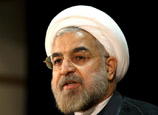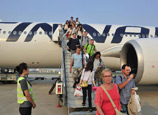
TEHRAN, June 16 (Xinhua) -- Expectations home and abroad for Hassan Rouhani to bring changes to Iran in both its domestic policies and foreign relations are set to put the future president 's administration to a tough test.
Rouhani won Iran's presidency by garnering 50.7 percent of the votes, far ahead of his closest conservative rival, which showed Iranians' strong desire for changes.
Hopes for the president-elect are reflected in the responses to his victory by Iranian analysts and foreign leaders.
Davood Mohammadi, chief of the reformist Sharq newspaper, said the moderate's win demonstrated the Iranian nation's political maturity, namely resolving political tensions "through political means rather than confrontation."
Hadi Khaniki, a university professor, wrote in a commentary that the recent election demonstrated "the (Iranian) society backs the (Islamic establishment) and does not want it to be weakened by foreign threats and internal problems; instead, it wants reforms."
Political observer Amir-Abbas Najafi wrote in the reformist Bahar newspaper that "reconciliation was the message of the presidential election," which will help the nation "survive in the current international and regional condition."
Conservative Kayhan International Daily said Rouhani's margin of victory was a huge surprise, thanks to several factors including his pledge to improve the economy.
Iran's Supreme Leader Ayatollah Ali Khamenei in a message on Saturday thanked the Iranians for "creating an epic" by their high turnout in the election which, according to him, "nullified the plots" of Iran's enemies. Iran has accused the United States of seeking to deflate voter participation.
Congratulating Rouhani on his presidential victory, incumbent Iranian President Mahmoud Ahmadinejad said "I believe that all peaks of glory are achievable by believing and trusting in the Iranian nation and by respecting different interests and tastes."
Rouhani's main supporter, and former president, Akbar Hashemi- Rafsanjani also said "Iran held the most democratic election in the world," Tehran Times daily reported on Sunday.
He expressed hope that the elected president would make every effort to fulfill his pledges, resolve the economic problems and improve foreign relations based on national interests.
Meanwhile, the UN and world's major powers responded to the result of Iranian election with expressions of hope for better relations with the country.
In a statement, UN Secretary-General Ban Ki- moon extended his "warm congratulations" to Rouhani over his win in the Iranian presidential election.
"The secretary-general intends to remain engaged with the Iranian authorities and with the president-elect on issues of importance to the international community and the welfare of the Iranian people," a UN statement said. "He will continue encouraging Iran to play a constructive role in regional and international affairs."
Also, the White House said in a statement Saturday that the United States remains ready to "directly" engage the incoming Iranian government in order to solve the stalemate in nuclear talks diplomatically.
The White House also said in the statement that Washington respects the "vote of the Iranian people", while congratulating them for "their participation in the political process."
"It is our hope that the Iranian government will heed the will of the Iranian people and make responsible choices that create a better future for all Iranians," said the White House.
The United States has long accused Tehran of secretly developing nuclear weapons, but Iran has denied the accusation, insisting its nuclear program is meant for civilian purposes only.
On Saturday, French Foreign Minister Laurent Fabius said that his country is ready to work with the Iranian incoming president, Rouhani, on a range of issues including the nuclear issue of the country and the Syria conflict.
Fabius acknowledged that the recent election was in line with the Iranians "desire for democracy."
Also, German Foreign Minister Guido Westerwelle welcomed the Iranians' choice as a vote for change and "a constructive foreign policy."
In a message after winning the election, Rouhani promised to form a government of "wisdom and hope" and draw up a blueprint on civil rights.
Analysts attributed his win to a large turnout of voters who saw him as the best choice to translate their hopes into real changes in Iran's domestic and foreign policies.
















 Developer razes historic Guangzhou structures
Developer razes historic Guangzhou structures


![]()
